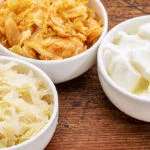
Mental Health
Probiotics For Depression: Improve Mental Health Naturally
Oct 12, 2017Most people ignore the direct connection between diet and mental health. Certain foods, such as probiotics, are known to improve mental health and work against conditions like depression. Find out more probiotics for depression.
The Gut-Brain Connection
Before we move on to understand the role of probiotics for depression, let’s understand the connection between the gut and the brain.
The “gut-feeling” we are told not to ignore must have some truth to it, right? Why do you think you get “butterflies in your tummy” right before an important event? Since you’re nervous, shouldn’t your brain be the main part of your body that is affected? Well, that’s the reason why the gut is known as the second brain.
Our enteric nervous system (ENS) functions independently of the central nervous system (CNS), which is is the primary control center of the body. The ENS, which is embedded in the gastrointestinal system, is known as the ‘mind’ of the gut. The ENS consists of a web of neurons that regulate the following:
- Gastrointestinal motility or movement of food within the digestive system
- Immune response of the body
- Detection of nutrients the food
- Microvascular circulation (blood circulation in the smallest blood vessels)
- The secretion of body fluids and enzymes
ENS also makes use of neurotransmitters for various important functions of the body. For instance, acetylcholine stimulates muscle movement, aids in learning, and boosts short-term memory. Serotonin, another neurotransmitter, is associated with sleep, concentration, and alertness. And dopamine affects emotions, physical movement, and sensations of pain and pleasure.
Probiotics For Depression: How They Work?
When levels of these neurotransmitters are low in the brain, you will start to feel ‘low.’ However, the friendly bacteria living in your gut may hold the key to ending your depression. The gut has the lion’s share of serotonin (95%) and dopamine (50%) in the body. Instead of using antidepressants (which alter the activity of neurotransmitters in the brain), using probiotics for depression would help more. The good bacteria in probiotics help in activating communication between the ENS and the CNS. This two-way communication network is known as the “gut-brain axis”.
Instead of using antidepressants for altering the activity of neurotransmitters in the brain, probiotics are a better option. Your gut bacteria will be equally effective in activating the neural pathways and signaling systems between the ENS and the CNS. This two-way network of communication is known as the “gut-brain axis.”
In one trial, volunteers were given a probiotic pill containing strains of Lactobaccilus helveticus and Bifidobacterium longum for 30 days regularly. At the end of 30 days, they showed less psychological stress. Another trial was done on patients of Chronic Fatigue Syndrome, a condition characterized with disrupted GI functioning and anxiety. The trial revealed that patients who received a daily dose of Lactobacillus casei for two months showed fewer anxiety symptoms.
These studies highlight the effectiveness of probiotics for depression. Natural sources of probiotics like yogurt and kimchi, or probiotic supplements are a good way to begin.
References:
Cryan, J. F., & O’Mahoney, S. M. (2011). The microbiome-gut-brain axis: From bowel to behaviour. Neurogastroenterology and Motility, 187-192.
Foster, J. A., & Neufield, K.-A. M. (2013). Gut-brain axis: how the microbiome influences anxiety and depression. Trends in Neurosciences, 36(5): 305-312.
Huang, R., Wang, K., & Hu, J. (2016). Effect of Probiotics on Depression: A Systematic Review and Meta-Analysis of Randomized Controlled Trials. Nutrients.
Jade, K. (2017, April 3). Depression. Retrieved from University Health News: http://universityhealthnews.com/daily/depression/the-best-probiotics-for-mood-enhancing-the-gut-brain-connection-with-psychobiotics/



